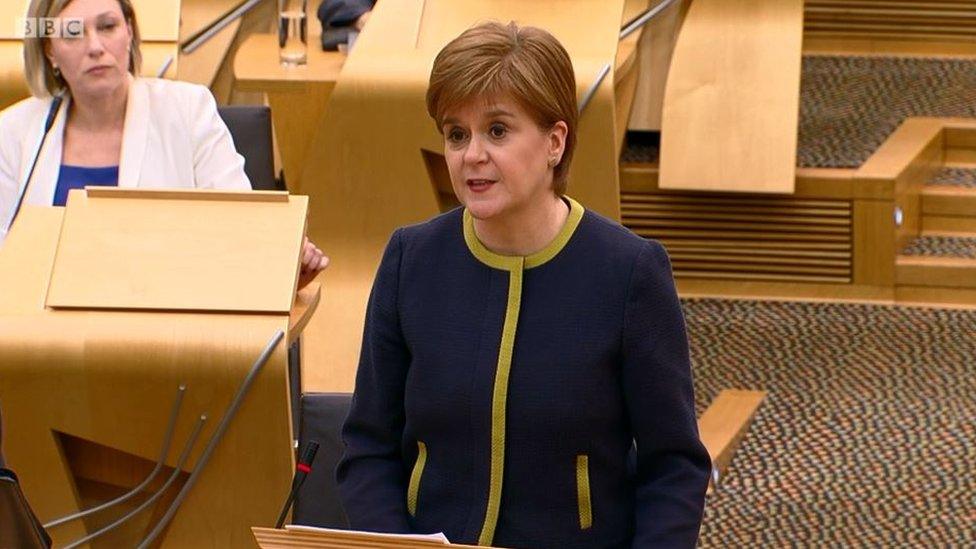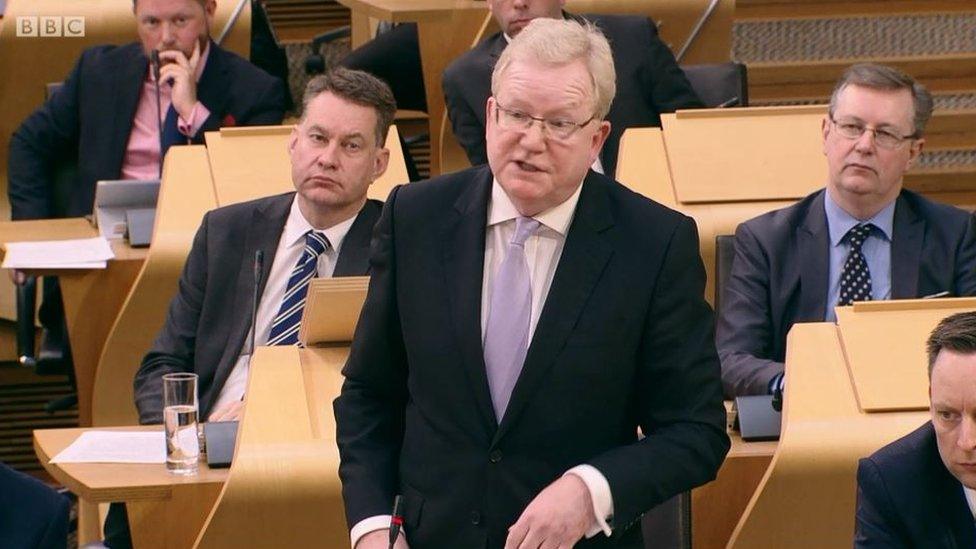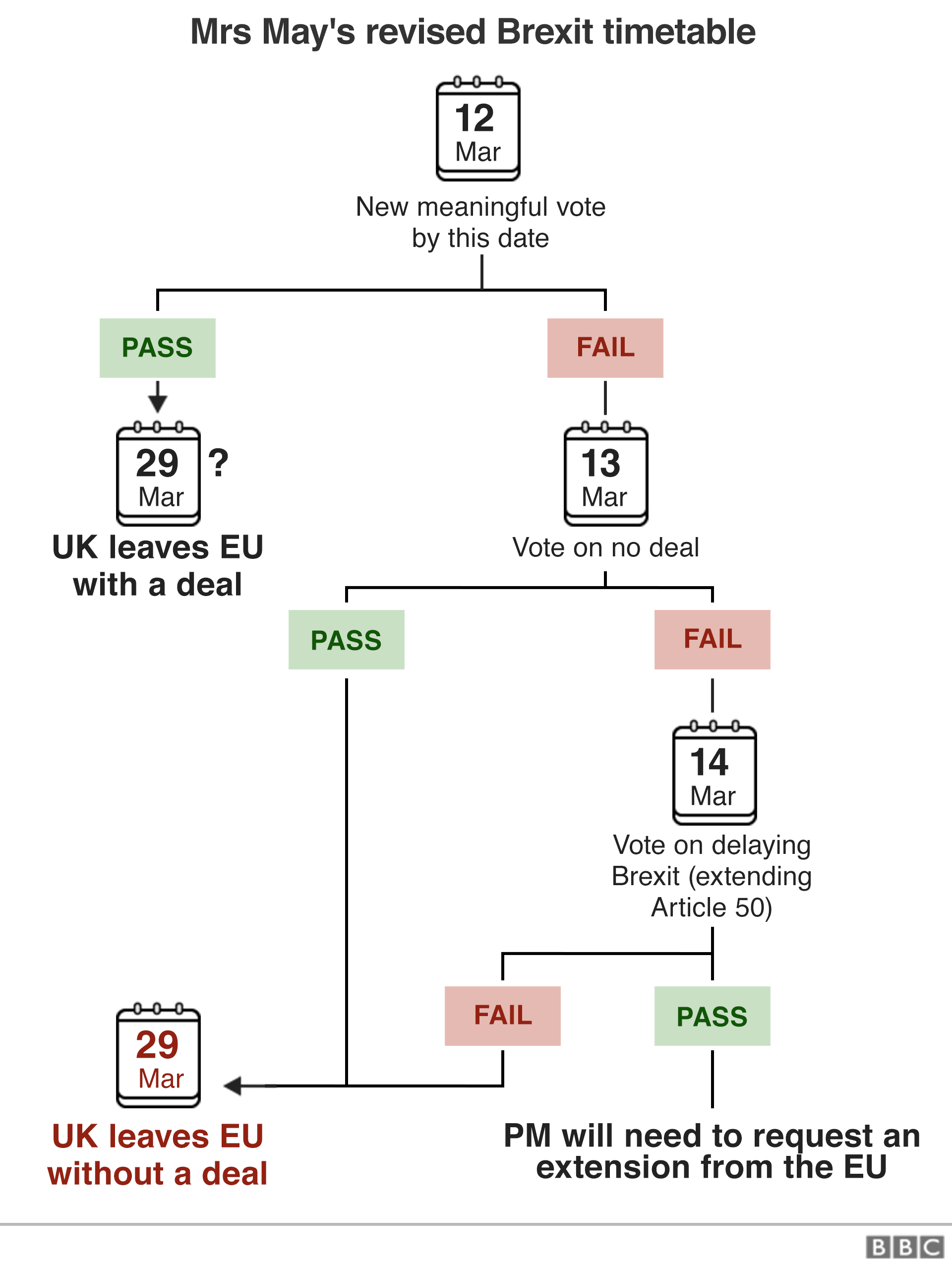Brexit: Scottish and Welsh parliaments pass joint motion
- Published
- comments

The Scottish Parliament and the Welsh Assembly will have co-ordinated votes on the motion
Scottish and Welsh politicians have joined forces to urge the prime minister to change her position on Brexit.
The Scottish Parliament and the Welsh Assembly voted to pass identical motions calling for the planned exit date of 29 March to be put off.
MSPs and AMs also reiterated their opposition to the UK government's plans and to leaving the EU without a deal.
The UK government said its deal was a good one for Scotland and Wales.
It said the focus should be on gaining further assurances from the EU to allow the prime minister's deal to go forward.
Mrs May has promised MPs a vote to delay Brexit if they cannot agree on her deal.
This was the first time in 20 years of devolution that the Scottish Parliament and National Assembly for Wales had debated the same motion simultaneously.
Leading the debate at Holyrood, First Minister Nicola Sturgeon said the Scottish and Welsh governments had been "brought together by our dismay, bordering now on despair, at the UK government's handling of Brexit".
She said the Brexit process should be extended "long enough to enable a better path to be taken" - either a compromise exit which would keep the UK in the single market and customs union, or her preference of a second EU referendum.
She added: "Pressing ahead with Brexit, knowing we are heading for disaster, makes no sense at all. Whatever most people voted for, it certainly wasn't where we find ourselves now."

Nicola Sturgeon opened the debate at Holyrood
Scottish Conservative interim leader Jackson Carlaw said Mrs May's proposed deal could provide a "smooth and workable" exit from the EU, and would provide the groundwork for a "strong and abiding friendship" with the bloc going forward.
The MSP argued that if the prime minister's deal was rejected, then the "default" result would be the UK leaving without a deal - "no amount of bluster gets away from it".
He said: "No amount of talking or debate or argument gets around the cold, immovable fact that if there is no agreed deal, then we leave with no deal".
'A new approach'
Scottish Labour backed the motion, in tandem with the Labour administration in the Welsh Assembly.
Leader Richard Leonard said Mrs May's deal was "dead", arguing that "there has to be a new approach" to avoid a "completely unacceptable" no deal exit.
He said Labour still hoped there would be a chance to "fundamentally revise" the Brexit deal or to force a general election, but said if this was not possible then there was "no choice" but to hold a new referendum.

Jackson Carlaw said rejecting Mrs May's deal would see the UK revert to the "default" of a no deal exit
Scottish Green co-convener Patrick Harvie also argued in favour of a new referendum, saying the UK government's negotiations had demonstrated "incompetence on a historic scale" and saying "this chaos must be stopped".
And Scottish Lib Dem leader Willie Rennie said politicians should "give the British people the final say", with a referendum on endorsing Mrs May's deal or remaining in the EU.
MSPs ultimately voted by 87 to 29 to pass the motion, while AMs in Wales did so by 37 to 13.
The debates in the devolved parliaments come as UK ministers resumed their efforts to secure legally-binding changes to the prime minister's Brexit deal that might get MPs' backing in a week's time.
UK Brexit Secretary Stephen Barclay and Attorney General Geoffrey Cox will meet EU officials in Brussels in search of guarantees over the backstop plan to avoid border checks in Ireland.
MPs will vote on the deal by 12 March, with the UK currently due to leave the EU on 29 March.
Leading Brexiteers are seeking assurances that the backstop - a controversial plan which will see the UK aligned with EU customs rules until the two sides' future relationship is agreed or alternative arrangements worked out - will not endure indefinitely.
Confused by Brexit jargon? Reality Check unpacks the basics.
A UK government spokeswoman said: "An orderly Brexit is in the UK's best interests and the best way to achieve that is for MPs of all parties to support the prime minister's deal.
"The deal is a good one for Scotland, Wales and the whole of the UK - it delivers the result of the referendum, gives us a close future partnership with the EU, and guarantees citizens' rights.
"Refusing to support the prime minister's deal simply makes a damaging no deal more likely."

